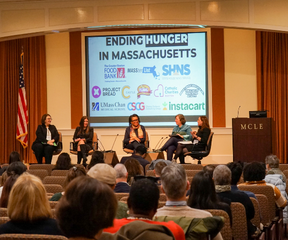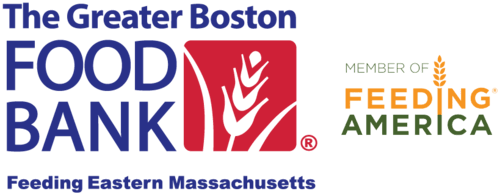GBFB and Hunger Relief Organizations Convene Legislators and Advocates Around Solving Hunger in Massachusetts
On January 25, The Greater Boston Food Bank partnered with State House News Service/MASSterList to host an event on hunger in Massachusetts. Featuring anti-hunger leaders from across the state, the discussion focused on how Massachusetts can end hunger by 2030 through advancing the national strategy outlined at the White House Conference on Hunger, Nutrition and Health last September. The event was kicked off by remarks from Congressman Jim McGovern, setting the stage for a lively panel discussion.
Watch full video of the event below.
 Karen Holmes Ward, CityLine Host, WCVB, moderated the discussion about opportunities and obstacles for Massachusetts to eliminate food insecurity in the Commonwealth. Panelists included Catherine D’Amato, The Greater Boston Food Bank President & CEO, Erin McAleer, Project Bread President & CEO; as well as the Co-Chairs of MA Food System Caucus, State Senator Jo Comerford and State Representative Hannah Kane.
Karen Holmes Ward, CityLine Host, WCVB, moderated the discussion about opportunities and obstacles for Massachusetts to eliminate food insecurity in the Commonwealth. Panelists included Catherine D’Amato, The Greater Boston Food Bank President & CEO, Erin McAleer, Project Bread President & CEO; as well as the Co-Chairs of MA Food System Caucus, State Senator Jo Comerford and State Representative Hannah Kane.
Hunger and access to proper nutrition remain pervasive, with nearly 1 in 3 adults experiencing food insecurity in Massachusetts in 2021, an increase from 2020. Hunger disproportionately impacts Black and Latinx populations, and visits to local food pantries have not returned to pre-pandemic levels.
“While we maintain high levels of demand, the cost of essentials like eggs – which more than doubled in the past year – impacts our buying power and inventory,” said GBFB President and CEO Catherine D’Amato. “We fear this is the third wave in a three-year ongoing crisis. The size of our state and the collective will to end hunger makes us capable of doing so – but it’s something we must all tackle together.”
“The size of our state and the collective will to end hunger makes us capable of doing so – but it’s something we must all tackle together.” – Catherine D’Amato, GBFB President and CEO
The issue of food insecurity recently gathered national leaders at a historic White House Conference – 50 years in the making – on Hunger, Nutrition, and Health where a national strategy was developed to end hunger and reduce diet-related disease in America by 2030.
“The White House Conference was just the beginning,” said McGovern. “The national strategy lays out what all levels of government can be doing: local state and federal, as well as what philanthropic and non-profit partners can be doing to implement the strategy. Here in Massachusetts, we are already hard at work to implement an ambitious blueprint to end hunger statewide.”
Since September’s conference, hunger-relief stakeholders across the Commonwealth have been convening to build a framework for achieving this goal, drawing on the expertise spearheaded and piloted here. In a letter to the Healey-Driscoll administration, a group of 19 hunger-relief stakeholders, convened by Project Bread, outlined five pillars around which to focus collective efforts to end hunger in Massachusetts by 2030:
- Pillar 1: Increasing access and improving quality of child nutrition programs
- Pillar 2: Increasing access and affordability of food for all
- Pillar 3: Integrating food access into health care
- Pillar 4: Strengthening and integrating the local food system
- Pillar 5: Ensure economic stability and promote economic opportunities to address the root causes of hunger
“We need to be mobilizing legislators to make this a top priority. We need to bring more people to the table to advocate for these solutions,” said Project Bread President and CEO Erin McAleer. “The systems around people who have experienced hunger are failing them, which is why lifting up the voices of people with lived experiences is necessary to help break the stigma and address the hunger inequality with systemic solutions.”
“It’s not just a humanitarian effort – the fiscal benefit of ending hunger is something we should talk about more,” said State Representative Hannah Kane. “Where will we find the money to alleviate hunger? It’s in the savings. We need to be united in doing this work, and we need to present a strategic plan that eliminates hunger, tackles diet-related disease, strengthens our food system—encouraging legislative leadership to see the issue in totality.”
“Ending hunger is both a bipartisan and bicameral effort. We are collectively filing bills that include policies from managing food waste, to providing infrastructure for our farmers,” said State Senator Jo Comerford. “The real ingredient in the statehouse is you. Advocates, admin officials, folks across the Commonwealth need to join and bring a legislative call to action. When we feel the charge coming from constituents, it helps galvanize us. I believe we can create a virtuous cycle where the people in Massachusetts get healthier because there’s no food insecurity to take us down.”
The event was sponsored by State House News Service, The Greater Boston Food Bank, The Castle Group, Brian Hickey Associates, Charles Stefanini Consulting Group, Project Bread, Instacart, Teddie Peanut Butter, UMass Chan Medical School, and Catholic Charities of Boston with support from About Fresh, Children’s Health Watch, Community Servings, Daily Table, Friedman School of Nutrition Science and Policy at Tufts University, Food Bank of Western MA, MA Food System Collaborative, Mass General Brigham, Mass Law Reform Institute, Stone Soup Café, and Worcester County Food Bank.
